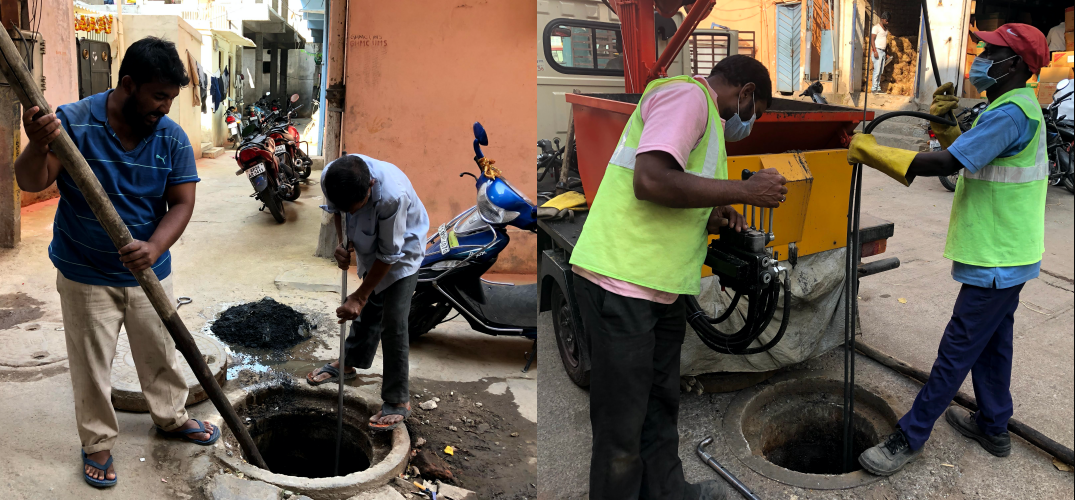There’s no doubt that manual scavenging is the most inhumane occupation in India.
As COVID-19 destroys millions of lives, marginalised groups are the worst affected. The recent surge against racism and rise of the Black Lives Matter movement in the US shows that there is rising awareness against systemic oppression. But despite some discussion, the struggles of oppressed castes continue to be largely ignored in India.
In a pandemic, the importance of sanitation workers is clearer than ever before. Yet these workers are struggling to afford basic necessities. They are essential public health workers risking their lives daily, but still being exploited and demeaned.
Having heard about an initiative in Hyderabad by the Safai Karamchari Andolan, a movement which aims to eradicate manual scavenging, we visited the city in March. In the last seven years, there have been more than 15 sewer deaths in Hyderabad alone. In 2014, the Supreme Court announced Rs 10 lakh as compensation for all families who had lost a member to manual scavenging, but reports have shown that this compensation has largely remained either unpaid or partially paid.
Since their husbands’ deaths due to asphyxiation inside a manhole, Mangala* and Usha* have struggled to provide food and education for their young children. Usha teared up while talking about her predicament. “Please see if I can get a job. I cannot pay for my daughters’ education any longer.”
As two high school girls, all we could say was that we would be back soon, with something to share.
There is a stark contrast between the sewage cleaning sites supervised by the SKA and those of the government. The SKA provides workers with personalised protective equipment. Workers know they are valued by the organisation, which is working tirelessly to make their situation better. However, this level of concern for safety and dignity is seldom found when it comes to workers employed by contractors and the government. Neither are they provided with PPE, nor with effective machinery. They have to handle human excreta directly, and subject themselves to noxious fumes.
Ravi, general manager of Ajanta Techno Solutions Pvt Ltd, a company which provides SKA with machines, told us about the financial difficulty in purchasing more machines. “The government should hold private contractors accountable on providing workers with PPE,” says Ravi with concern. During the COVID-19 outbreak, Ravi says workers are wearing masks because the pandemic, but additional safety gear like gloves and boots is still missing. Meanwhile, the SKA continues to provide all the protective equipment, thus keeping not only their workers’ health in place, but also their dignity.
Also read: Want to Help Sanitation Workers? Segregate Your Waste
SKA strives to create jobs for women who have lost their husbands to sewer deaths while also replacing manual cleaning with machines. Mangala, who lost her husband in 2016 and is now operating machines, told us, “I have been fighting for compensation, but haven’t received the full amount yet. Working with these machines provides me with some financial support, but additional remuneration from the government would be very helpful.”
If Mangala’s husband had the appropriate PPE and working conditions, he would be alive today, as would the nearly 2,000 sewage workers who die every year across India, according to the data on SKA’s website.
Bezwada Wilson, the national convenor of the SKA, had visited the UWC Mahindra campus in January and inspired us with his talk on SKA’s fight for the rights of India’s sewage cleaners. It was Wilson who had told us about what was happening Hyderabad.
Saritaji* in Hyderabad said that 20 years ago, when dry latrines were functional, they would carry baskets full of human excreta on their heads. Although the situation has relatively improved, the ingrained hierarchical caste system forces her family to continue this work. Caste discrimination has been normalised and has compelled such families into believing that manual scavenging is their duty and the only job they will get. Saritaji said, “Beta, we have grown old doing this. Many said they would change our circumstances, but no one has managed to because nobody truly cares about us. God willed us to do this, so we will persist till our last days.”
Their dreams, aspirations and hope for change are fading away.
As our first contribution towards eradicating manual scavenging, we are starting a fundraiser to buy PPE for 2,000 government-appointed workers in Hyderabad who clean without them. This may not be a permanent solution, but it could set an example for the government, contractors and especially workers so they realise that their health and safety have to be prioritised.
It’s heartbreaking to see the magnitude of injustice surrounding us that goes unnoticed. The problem was so overwhelming that two 18-year-old girls felt almost helpless while promising to make a difference in their lives. We decided that we need to go back to Ushaji with something in our hands; we need to show Saritaji that there is still hope. It’s time to speak up to ensure justice for our frontline warriors, as Bezwada Wilson rightly calls them.
*Names changed.
Tejashree Jadhav, a recent graduate of UWC Mahindra, is from Pune and is about to begin an undergraduate course in liberal arts at Whitman College, Washington. Ashira Biswas also just graduated from UWC Mahindra and is set to begin a Bachelor of Science in Economics at Trinity College, Connecticut.
Featured image: Government sanitation workers without proper PPE (right), and SKA workers with appropriate PPE and machines (left). Photo provided by authors

